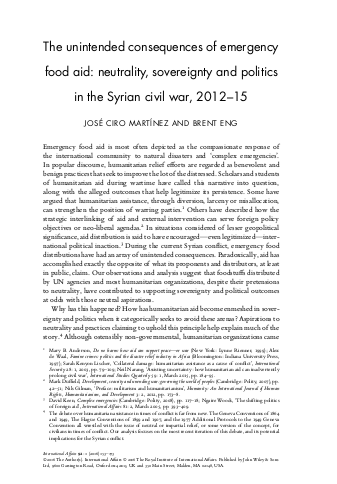
Emergency food aid is most often depicted as the compassionate response of the international community to natural disasters and ‘complex emergencies’. In popular discourse, humanitarian relief efforts are regarded as benevolent and benign practices that seek to improve the lot of the distressed. Scholars and students of humanitarian aid during wartime have called this narrative into question, along with the alleged outcomes that help legitimize its persistence. Some have argued that humanitarian assistance, through diversion, larceny or misallocation, can strengthen the position of warring parties. Others have described how the strategic interlinking of aid and external intervention can serve foreign policy objectives or neo-liberal agendas. In situations considered of lesser geopolitical significance, aid distribution is said to have encouraged—even legitimized—international political inaction. During the current Syrian conflict, emergency food distributions have had an array of unintended consequences. Paradoxically, aid has accomplished exactly the opposite of what its proponents and distributors, at least in public, claim. Observations and analysis presented in this article suggest that foodstuffs distributed by UN agencies and most humanitarian organizations, despite their pretensions to neutrality, have contributed to supporting sovereignty and political outcomes at odds with those neutral aspirations.